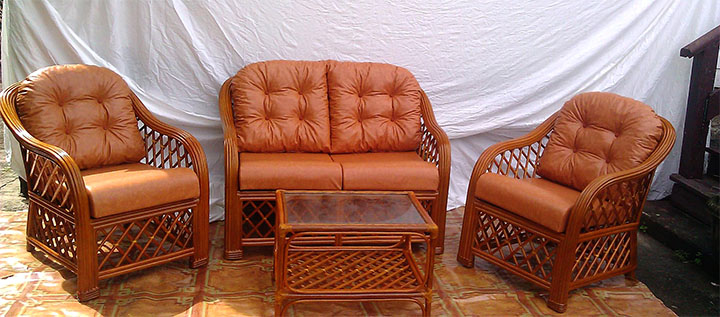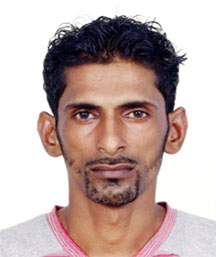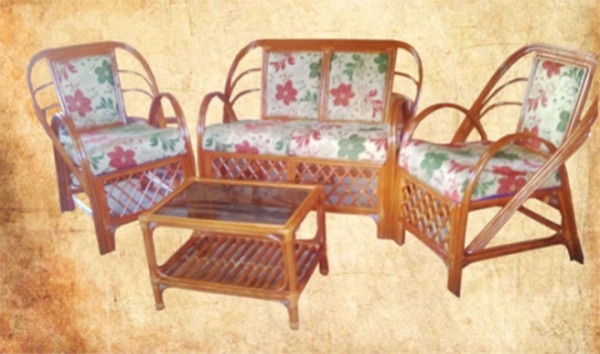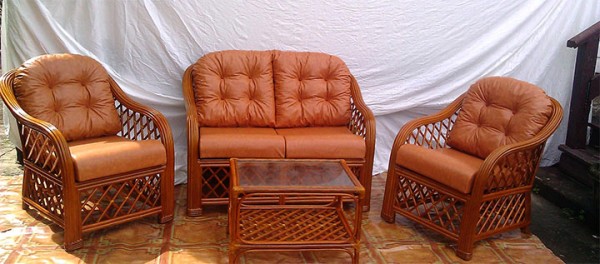Deen Douglas has become used to seeking out markets in Caribbean countries and further afield for his wicker and rattan furniture.
In fact, he makes no secret of his preoccupation with trying to meet what he says is the encouraging overseas demand for his furniture. He may be disappointed over the fact that, these days, local taste favours—in the main—the plush living room suites and other eye-catching pieces of furniture on offer in downtown stores. Still, he believes there is something qualitatively superior about his own offerings, fashioned from local materials and designed to show off Guyana to the world.
Stabroek Business first met Douglas at his business place, Deen’s Wicker Furniture on Victoria Road, Plaisance almost three years ago in September 2012. At the time it had been four years since he had opened his own business and he was preoccupied with breaking into the overseas market. Since then, he says, “things have started to look up.”
Twice every year, he ships consignments of his furniture to Suriname. Meanwhile, he has been painstakingly building markets in Barbados and Trinidad and Tobago too. Experience has taught him that there is a greater appetite for his work on the external market; that is why he is one of a contingent of 25 local producers attending the May 18 – 22 Barbados Manufacturers Exhibition (BMEX) event which will be held at Lord Erskine Sandiford Centre in Bridgetown. It is, he says, an opportunity to widen his client base in a Caricom territory that has traditionally provided a more than useful market for furniture manufactured in Guyana. Beyond that, he is hoping that his pieces might catch the eye of visitors to the Barbados event from other Caribbean territories and from the United States who are expected to attend the event.
Persistence, Douglas says, is the price local exporters must pay for the reward of winning overseas markets. It took several visits for an outlet in Miami to finally pay an interest in his work. Douglas says that when last he was in touch with the company it indicated that it was still scouting the market for buyers. Patience, it seems, is another virtue that aspiring Guyanese exporters must have. He is optimistic about Miami. The local shops are constantly on the lookout for tasteful furnishings to catch the eye of residents who never seem to relent in their appetite for eye-catching home furnishings.
With BMEX around the corner, Douglas has completed his selection of furniture samples for Barbados. Once he arrives there the tough job of ‘marketing’ his creations begins.
It is a long way from the distant, even remote regions of Guyana where Douglas gathers his raw material for his creations to the elegant shops of Miami and the upmarket trade fairs of the Caribbean. Kufa and nibbi (wicker) are well-known vines and grasses that lend their own unique creative touch to the furniture they produce. They grow wild and untended and are valued only by the relative handful of craftsmen who have the skills to infuse beauty into them; these have always been at the centre of Douglas’s productive pursuits.
Before setting up his own business, he had worked as an upholsterer with an uncle at Mon Repos. After two years in his uncle’s employ he moved on, joining Samuel’s Wicker, Rattan and Upholstery Establishment at Eccles, East Bank Demerara and remaining there for 12 years. It was here that he learnt the skills that now represent his livelihood.
No trade is without its challenges. In much the same way that producers in other sub-sectors of the furniture sector clamour about the difficulties associated with securing high-quality wood, so too does Douglas talk about what are often his own trials associated with acquiring raw material.
Wicker is a slender flexible vine that is woven into patterns, the result being wickerwork. Wicker furniture is furniture that is made from weaving branches around a frame and into the shapes of tables, chairs, and sofas. Wicker furniture can be fashioned out of willow, rattan, bamboo, reed, or synthetic materials and is commonly available with natural, stained or painted surfaces; some wicker furniture is dipped in special coatings to resist fading and reduce flaking and cracking.
Wicker furniture is by no means unique to Guyana. Skilled weavers in Asia have secured a considerable portion of the North American market where tropical home settings and casual rooms lend themselves to the use of indoor wicker furniture particularly well because of its light and airy nature. It is many times paired with colourfully patterned cushions.
Wicker furniture is also used as outdoor patio furniture. Because of its comparable light weight, the furniture is easy to position around the yard and easy to move indoors.
For all these reasons wicker furniture enjoys a large and significant metropolitan market and Douglas is only too well aware that high standards are critical to securing and expanding his overseas market. Wicker is particularly common in the Amerindian craft industry and is common in the manufacture of various types of decorative furniture.
The production of Rattan furniture, Douglas says, depends in the availability of Kufa, a particularly strong parasitic vine that infests large trees in various parts of Guyana. Douglas’s primary sources of Kufa are the Pomeroon River, the Barima-Waini and Mabura. Every two months or so he is in touch with his suppliers though the dynamics of supply and demand mean that prices fluctuate.
Then there is the processing of the Kufa. It begins with the de-barking of the vine after which it must be detoxified by soaking in a chemical solution. Further detoxification is achieved through steaming. The treated product is sanded, farmed then transformed into one or another of Douglas’s creations.
Materials, processing and labour costs can make Rattan and Nibbi furniture more costly to produce than their upholstered distant cousins. Douglas explains that it is not only a craft but a pursuit that requires patience. Most of his workers come from the Pomeroon, a location noted for its weaving and framing skills. Douglas says it makes them prized workers in a sector where skills are scarce and production costs high. Framers commonly earn as much as $20,000 per week and sprayers commonly take home around $15,000 per week. To labour costs must be added the costs of material. These days lacquer costs about $8,000 per gallon in addition to which there are other costs associated with the purchase of upholstery material, buttons and threads.
Deen concedes that local patronage is restricted by the fact that his establishment does not offer the facility of either hire purchase or layaway arrangements. The overseas market provides him with the facility of a faster turnover.
Here at home, times are very different to when he set up his own establishment eight years ago. Most of his local clients are hotels, bars and restaurants. Douglas provides them with rockers, couches, bar stools, living room sets, dining room sets, and patio furniture. It is the decorative finish of his furniture that they find appealing. GuyExpo has been pursued as an option in an effort to breathe new life into the local market and while Douglas admits that there is usually a brief spike in sales after the event it sustains itself only for a limited period.
The cost of one of Douglas’s three-piece living room sets is around $130,000; rocking chairs cost $30,000 each while a five-piece dining set can cost as much as $110,000.
Douglas’s immediate-term ambitions are constrained by the limits of resources. He believes that a ‘high street’ showroom would transform his fortunes on the local market but ‘high street’ prices are beyond his reach at this time.
His faith in the commercial banking system, he says is conditioned by having had his loan applications turned down. Borrowing is limited to modest loans from secured from the Institute of Private Enterprise Development (IPED).
The varied tastes of his overseas clients has compelled Douglas to scour the internet for new designs. Others, like the Emmanuel Wicker named after his son, are created from local designs.
The responsibilities of serving an overseas market, not least those associated with shipping have added further demanding responsibilities to those which Douglas already has on his plate. Unable to execute those on his own he has had to secure the services of a Broker to undertake the ‘paperwork. Prior to shipments leaving Guyana they must go through a bureaucratic mill that involves engagements with the Forestry Commission, the Ministry of Agriculture’s Plant Quarantine Division and the Customs Anti-Narcotics Unit.
In overseas markets, where there is no shortage of competition high-quality products are essential to the customer retention. Often, there are no second chances with overseas buyers. One sub-standard shipment or even a single defective piece of furniture can cost a supplier a valued client. Douglas understands that if he is to secure his markets. He must therefore set his own standards which, naturally, extend to his workers.
He is anticipating the BMEX event. The support afforded in Barbados by the Guyana Office for Investment and the Guyana Consulate in Barbados provides a measure of assurance in an environment where being alone could mean getting left out. But then, Douglas says, he has done it all before and that this time around he has to make it work for him.













